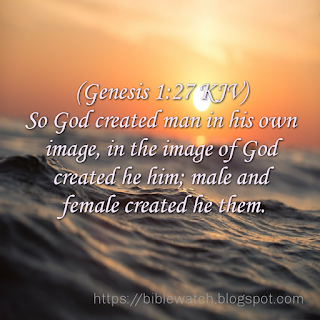HE IS NOT GOD OF THE DEAD BUT OF THE LIVING. WHAT DOES THIS MEAN?
Some Christians often quote the bible phrase "God is not the God of the dead, but of the living: for all live into him" as proof that people never really die, but rather their "soul" continues to live on after death.
We will take a closer look at the entire story in context in the book of Luke chapter 20 verses 27 to 38 to have a better understanding of the phrase and it's meaning:
(Luke 20:27-36 KJV) Then came to him certain of the Sadducees, which deny that there is any resurrection; and they asked him, Saying, Master, Moses wrote unto us, If any man’s brother die, having a wife, and he die without children, that his brother should take his wife, and raise up seed unto his brother. There were therefore seven brethren: and the first took a wife, and died without children. And the second took her to wife, and he died childless. And the third took her; and in like manner the seven also: and they left no children, and died. Last of all the woman died also. Therefore in the resurrection whose wife of them is she? for seven had her to wife. And Jesus answering said unto them, The children of this world marry, and are given in marriage: But they which shall be accounted worthy to obtain that world, and the resurrection from the dead, neither marry, nor are given in marriage: Neither can they die any more: for they are equal unto the angels; and are the children of God, being the children of the resurrection.
(Luke 20:37-38) “But now, as to whether the dead will be raised—even Moses proved this when he wrote about the burning bush. Long after Abraham, Isaac, and Jacob had died, he referred to the Lord as ‘the God of Abraham, the God of Isaac, and the God of Jacob. Now He is not God of the dead, but of the living; for all live to Him."
It is clear from the above verses that the issue in question is God's power or ability to raise the dead from the grave in a resurrection, something the Sadducees clearly rejected. The main question is about resurrection from the dead and not about longevity of the human soul or a proof that people never really die and that their "soul" continues to live on after death.
The phrase simply means that the Lord is not the God of dead beings, but of living beings. The meaning of the Lord's argument is that God would never have called himself the God of Abraham, of Isaac, and of Jacob, if these patriarchs have been annihilated. He implied that he had still to do with them - had a blessing and a reward which they were to receive, and which they must be alive to enjoy. He is the God of the living, and that is why man will resurrect.
The statement also distinguishes God of Israel from other nations like Egypt which have God for the dead souls and believe that people live on after death. Jesus is saying here that God is not God of dead souls but God of souls that are alive.
The statement also distinguishes God of Israel from other nations like Egypt which have God for the dead souls and believe that people live on after death. Jesus is saying here that God is not God of dead souls but God of souls that are alive.
Someone may ask, what of the phrase "for all live to him" What does that mean, “all live to him”? The statement simply means everyone lives by His power and lives answerable to Him. It means everyone lives TO Him and not that everyone lives on after death.
Meanwhile, it is worthy of note that the strength of the Lord's argument does not consist in the verb, I am, nor in the use of its present tense at the time of Moses as some bible Scholars have stated. These Scholars stated that Exodus 3:6 and Matthew 22:32 used the present tense "I am" and not "I was", indicating that these patriarchs are still alive.
(Exodus 3:6 KJV) Moreover he said, I am the God of thy father, the God of Abraham, the God of Isaac, and the God of Jacob. And Moses hid his face; for he was afraid to look upon God.
(Matthew 22:32 KJV) I am the God of Abraham, and the God of Isaac, and the God of Jacob? God is not the God of the dead, but of the living.
However, if the strength of his argument is in the use of the present tense, the book of Luke would have contained "I am". More so He couldn't have used "I was" because "I am" is His name.
If you like our blog, kindly share your views, suggestions, and comments. Like our Facebook page @BibleWatch, follow us on Twitter @bible_watch and click the Subscribe button above.









Comments
Post a Comment